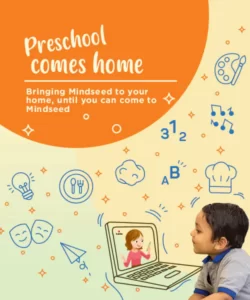Talking to your child regularly is very important for their emotional and behavioural development. But, let’s face it, we’re all busy as parents, and it’s easier to keep the conversation with our kids light so we can get on with the next item on our “to-do” list. In everyday life, light talk has its place, but there are times when your child requires you to tune in and listen more intently.
Your child will not tell you this, but he or she requires you to periodically pry into their inner lives to learn what they are thinking and feeling. Some preschools in Thane understand the emotional needs of children and the importance of having a constant conversation with them. But as parents, you too need to have strong communication with your child. This will not only help them understand their feelings better, but it will also improve your bond with them.
Here are six suggestions to help you make your communication effective with your child
Make direct eye contact
In a conversation, the body is just as important as the words. As a result, remember to keep eye contact with your child whenever you speak with him or her. This will demonstrate your interest in them and encourage them to speak freely. The best preschool in Mumbai uses this technique to create a bond with children. Parents can also achieve an active and transparent connection this way.
Recognize their emotion
Pay attention to your child’s expressions of each emotion, whether it’s in their words or their body language. The best preschools in Mumbai help parents understand this. It’s often useful to offer a comment or repeat what they’ve said. This conveys to them that you care about them, and their feelings, giving them an assurance that they have someone to turn to.
Try to delay the correction until you acquire more information
When your child negates you, no matter how desperately you want to reprimand them right away, avoid it, even if you believe they are wrong. Before you answer, give them a chance to speak. Better yet, take it a step further and ask your child questions related to the mistake they have made to find out why they did it and what was their intention behind it. This approach, generally used at preschools in Thane, will help you respect your child’s sentiments and encourage them to speak up. They will cooperate when you are willing to hear their worries instead of merely rectifying their mistakes.
Teach them how to say ‘No’
While parents should say no to their children and deny any wrongdoing or improper request, children should also be taught to say no anytime they are uncomfortable in a circumstance. It’s critical to emphasise that every “no” is not a negative response. It’s more likely to be a decision taken for your own protection and security.
More “Dos” than “Don’ts”
Don’ts are frequently addressed by parents in order to prevent their children from acting in specific ways. However, if used excessively in daily life, it can cause a youngster to become irritable or rebellious. Therefore, a kinder approach should be used to replace the “Don’ts” with “Dos”.
Make Use of Kind Words
Any relationship is built on the foundation of mutual respect. It also comes with the dialogue that occurs after pleasant remarks. When compared to a youngster who has been shamed or ridiculed, you can see that children who have been nurtured with admiration and respect have a higher sense of self-worth. As a result, stating words like “Thank you for your assistance” or “You did a nice job” is quite important.
Communication is the key for building a strong bond between parents and children. Before giving out a reaction, try to put yourself in your child’s shoes and understand the situation. We often expect our children to learn adult-like thinking patterns and do not consider their thinking. It is very important to understand their emotional and developmental needs in different situations. It is easier to be logical and understanding with appropriate involvement and constant communication.


